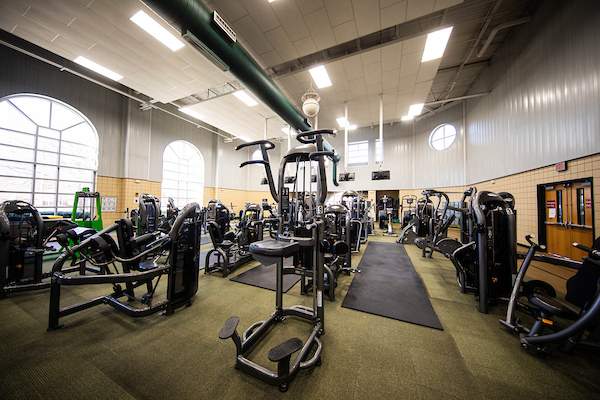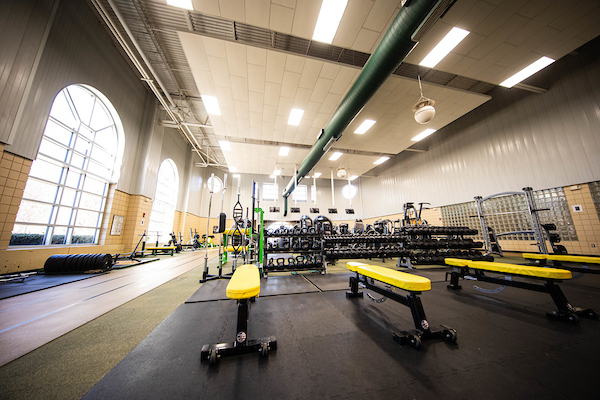The Rehabilitation Science (RS) major is an interdisciplinary program designed to
fully prepare ethical, culturally sensitive, inclusive, and socially just professionals
to enter the workforce and graduate-level education programs.
Specializing in working alongside persons living with a myriad of possible disabilities
and chronic illnesses, this major will equip students to take learned theories and
effectively apply them within real-time experiential learning opportunities. Students enrolled in the program can choose minors in addictions, child welfare and
social services, disability studies, and recreation services.
Graduates of this program will effectively serve the needs of the community, individuals
with disabilities, and populations within allied health/human service fields. The Program also prepares students for graduate school in clinical mental health,
rehabilitation counseling, physical therapy, occupational therapy, social work, allied
health professions, and other fields.
Hands-On Learning Opportunities
- Internships with field experience: A unique feature of the
Rehabilitation Science program is the requisite filedwork
experience during which students complete either a full-time,
single-semester Internship, or three separate semesters of
part-time, experiential activities in the Field Placement Series.
- Prior to graduation, students will have acquired 420+ hours of
on-site, professional mentoring specific to individual post-
graduation goals.
Skills you will learn
- Effective application of evidence-based practices.
- Evaluation of workload, effective service and client needs.
- Client advocacy.
Career Options
You could work as a(n):
- Case Manager
- Child Welfare Advocate
- Mental Health Pararprofessional/Quality Behavioral Health Paraprofessional
- Department of Human Services Staff
- OT/PT/Rehab. Tech
- Activities Coordinator
-
Alumni of our program work at:
- Department of Children and Family Services
- Department of Human Services
- Friendship Community Cares Services
- Restored Life Services (Addictions Treatment)
point of pride
This is the first brick and mortar undergraduate Rehabilitation Science program to
be accredited by the COmmision on Allied Health and Education Programs. (2021-2028)
Coming Fall 2025!!
What is Therapeutic Recreation?
Therapeutic Recreation focuses on the essential role recreational activities play
in enhancing individuals' physical, emotional, and social well being. It is vital
in society as it helps people with disabilities, illnesses, or other challenges lead
more fulfilling and active lives.
Potential Employment after Graduation
Graduates of the RS- Therapeutic Recreation program can find rewarding career opportunities
in settings like behavioral health facilities, clinical settings, community recreation
programs, and senior living facilities.
Program Benefits
By completing our program you will have met the requirements to sit for the Certified
Therapeutic Recreation Specialist (CTRS) exam and you will become a part of a community
dedicated to driving innovation and making a difference in the vibrant field of Therapeutic
Recreation.
The Master’s in Counseling Program is housed in the Kinesiology and Rehabilitation
Science department in the College of Education and Health. This 60-hour master’s program
will have two specialization tracks: Rehabilitation Counseling and Clinical Mental
Health. Each track will prepare students to enter the world of counseling to help
people to overcome any symptoms/barriers and create a better quality of life for themselves.
Our classes will be a mixture of in person and online learning and most of our courses
will be taught in the evenings for those that need to work to support themselves through
their graduate education in the counseling fields.
Rehabilitation Counseling Track:
Rehabilitation Counselor provide counseling to individuals with physical, developmental,
intellectual, and psychiatric diagnoses. Rehabilitation Counseling work for several
of the following agencies: Arkansas Rehabilitation Services, Veteran’s Association
(VA), Social Security, Worker’s Compensation, Rehabilitation Hospitals, and Colleges
and Universities. Students will be eligible to sit for the Certified Rehabilitation
Counselor Exam (CRC) after completing our coursework and practicum/internship.
Clinical mental health track:
Clinical Mental Health Counselors provide counseling to individual with mental health
and substance abuse diagnoses. Clinical Mental Health Counselors work in many of the
following settings: Counseling Agencies, Hospitals, Public Schools, Hospitals, Colleges
and Universities, and Private Practice. This program has been approved by the Arkansas
Board of Examiners in Counseling as being a “CACREP-like” program that would allow
for students to sit for their National Counseling Exam (NCE) which would lead to application
for Licensed Associate Counselor (LAC) and then Licensed Professional Counselor (LPC)
in the state of Arkansas.
Hands-on learning
Practicum and Internships: completing either track in this degree includes completion
of a one-semester Practicum experience and a one-semester Internship totally 700 hours
of professionally mentored on-site experience in the counseling field.
Skills you will learn
Learn to diagnosis and treat future clients
Learn counseling skills and techniques
Advocacy and building resiliency with your clients
Social justice perspectives to work with diverse clientele
You could work as a(n):
Vocational Rehabilitaiton Counselor
Mental Health Counselor
Addictions Counselor
Disability Services Director
Agencies where you could work:
Arkansas Rehabilitation Services
Chenal Family Therapy
Arisa Health
Turning Point (St. Mary's)
Restored Life Services
Lakepoint Recovery & Wellness
Harbor House, Inc.
Restored for Life
Real Practices, Inc. (Behavioral Health)
Colleges or Universities
The Coaching Strength and Conditioning Certificate of Proficiency addresses the growing demand for strength and conditioning professionals by aligning
with labor market trends. According to the U.S. Department of Labor’s Occupational
Network (O*NET), careers related to coaching, fitness training, and athletic performance
are experiencing strong growth, with job projections ranging from 4% to over 11% in
various roles. The program's goals include applying scientific and theoretical principles
in fitness, conducting fitness assessments, developing training programs, and enhancing
health and performance-related physical attributes. With these objectives, the certificate
prepares students for careers in coaching, athletic training, and fitness instruction
while meeting the increasing industry demand for qualified professionals.
The certificate program includes five key courses designed to equip students with
essential skills in fitness training, assessment, and coaching. The curriculum features
HES 2013 Weight Training for Personal Trainers, High School Athletics, and Strength
Coaching, focusing on strength training techniques for various populations. HES 2023 Endurance Programming and Conditioning emphasizes aerobic and anaerobic conditioning principles. HES 2043 Applied Fitness Assessment and Development trains students in evaluating and enhancing physical performance. HES 3013 Coaching Power, Speed, and Agility covers strategies for improving athletic explosiveness, while HES 4023 Principles of Strength and Conditioning provides a comprehensive foundation in strength training methodologies and program
design. These courses ensure students gain both theoretical knowledge and practical
application in fitness coaching and athletic performance.
The Coaching Travel Team and Recreational Sport Basic Certificate is designed to address the growing demand for qualified youth sports coaches by providing
foundational training in coaching principles and athletic administration. The curriculum
includes PE 3413 Coaching Theory, which covers essential coaching philosophies, strategies, and leadership techniques,
and PE 4513 Organization and Administration of Athletics and Physical Activity, which focuses on managing sports programs effectively. With the youth sports industry
experiencing rapid growth—expanding at a rate of 4.2% in 2022 and projected to grow
annually by 9.2% through 2030—this certificate fills a critical knowledge gap by equipping
coaches and supervisors with the skills necessary to ensure participant safety, health,
and development.








